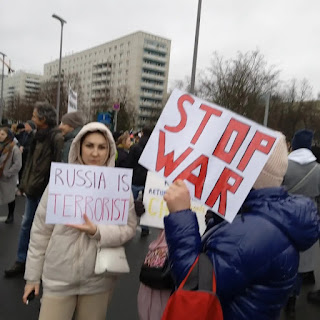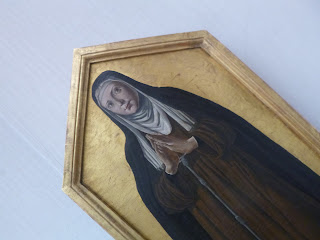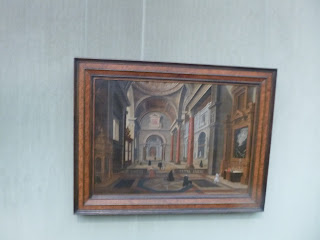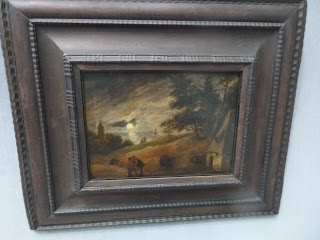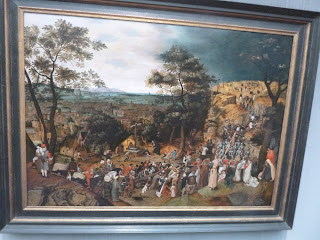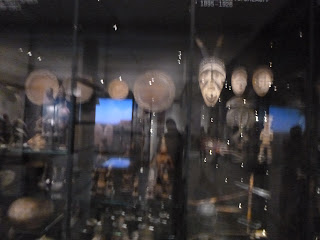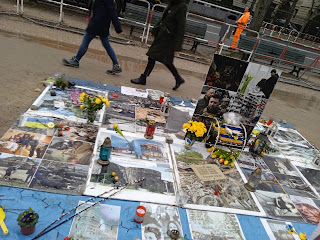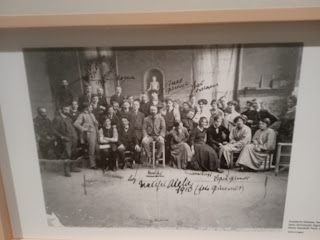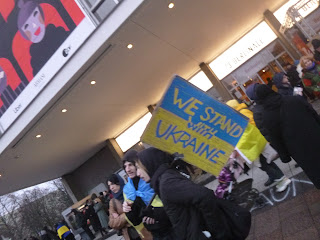Mom and Berlin, a Week on Unter den Linden, Strolling through History, One Year Later
Each week, I try to delve into a new neighborhood of Berlin to explore.
To prepare for exams on European integration, I dropped by the Europa Experience, an exhibition on the European Community in the European House in Berlin on Unter den Linden 78. It explores the lessons of seven decades of European Integration, the conflicts, and challenges of integrating over two dozen, close to three dozen countries, building on transnational, supernational cooperation instead of nationalism. Over decades, the emphasis has worked, yet the nation state has occasionally found its way back into the conversation, usurping the Monet method, in the late 1960’s and recently with the crisis years. Finishing the show, I walked up Unter den Linden to catch my train. A group of kids were standing there, outside the Russian consulate. I stopped at a replica of a jail cell, where Russian opposition leader Alexi Navalny has spent over three months in solitary confinement, with almost no ventilation, bed fastened to a wall, visits and parcels from outside prohibited. Installation by Oleg, Navalny's brother. Who knows how long he will spend there? Yet, nationalism is back. So are conflicts. Its like the Cold War again, Biden and Putin hashing it out, with China and India playing it both ways.
One person, who saw the whole thing is my mom.
She was there when the war ended, traveled, watched the conflicts, the invasions, and the ways it changed our world. Arriving from the airport, the ageless Dorothy Shepard told stories about blown out buildings, rubble along the streets from the second world war during her first visit here in 1957. That was a lot for a girl from Columbus GA, she told me. We were last here together in 2009, when the kids were little.
Onward, we checked in at our hotel, down the street from the Brandenburg Tor, the 18th-century neoclassical monument, built for Prussian king Frederick William II after beating back the Dutch popular unrest, just 450 meters from the Reichstag, where the German parliament sits. Some ninety years ago, on 27 February 1933, the same building burned. And just down the street at the Bebelplatz, Joseph Goebels organized book burnings on the 10th of May, 1933.
First stop, lunch and dinner at her hotel, then a fresh start.
Film goers zip to and from in the lobby when arrive, arriving for the festival.
And we sit to eat, planning our week.
Mom has a notepad full of places to go, beginning with the Pergamon and the Bode Museums, just up the street from us in the Museum Insel.
The next day, we head out, in the rain, exploring the first museums of the week on a rainy museum day. Out of the Bodes Museum, we walked out of our way to the Berlin Dome, the Majestic 1800s cathedral, looking for the Pergamon, the home to the Vorderasiatisches Museum and the Museum für Islamische Kunst, holding collections from the Ancient Near East, the Ishtar Gate, as well as Islamic Art. It's always strange to see this work, the Market Gate and the iconic Pergamon Alter piece, depicting the story of Telsphus, founder of Pergamon, and his son Heracles, now in repairs, that the Germans seem to have simply taken from Turkey and brought back to Germany in 1930, just a few decades after the Berlin Conference, codifying the colonization of Africa. Walking, the images and objects seemed to jog memories, Mom telling stories about her first trips here in 1957 with her mom, of hiking and camping in Anatolia in Central Turkey in 1965, the rugs and porcelain, countless memories of dad and Fred. I've had a wonderful time, said mom over coffee after visits to the Ishtar Gate of Babylon and the Market Gate from Miletus.
Finishing, we walked back through the rain down Unter den linden, in the central Mitte district of Berlin, Brandenburg Gate in the distance. It's really the street of history here, signs of Willy Brandt up on the walls, Napoleon, who marched down the boulevard on the 27th of October, 1806 along the way, books burned and new ideas ever reverberating.
At dinner, the teenager asked Grandmom about the Cold War days, the Cuban Missile crisis, etc. We talked about Kennedy and Eisenhower and the ways Berlin recalls Kennedy.
There are practically shrines to Kennedy, says the teenager, who goes to high school here.
They told Mom, they were reading Carson McCullers.
Born two decades before Mom, Carson was also a Columbus, Ga kid, who got out to make their way north to NYC, like Mom. Carson famously suffered, writing about an exquisite pain. “How can the dead be truly dead when they still live in the souls of those who are left behind?” she wondered. I think about Mom and her memories of Dad, talking about her trips in Turkey and Iran and Afghanistan with Dad, how sick he was most of the trip, still making the most of their journey together, mom traveling with her mom to Berlin and then around Scotland on that 1957 trip, a year or two before she died, just a couple of years before she met Dad.
After dinner, I roll mom back to her room. It was a long day, with only a stumble or two.
It's not always easy navigating the city.
The following day, we wander to the Alter National Gallery, the Old Natonal Gallerie, looking at the 19th century Germany masters. We’re each taken by Caspar David Friedrich, and his Abby Among the Trees, a romantic, even gothic work that I first fell in love with here in the summer of 1991 on a trip here. Mom and I talk about art and our love of strolls to see art together through the years. And then the topic turns to Jimmy Carter, now in hospice.
“Makes me sad,” said Mom, thinking of her former Governor and President.
“We were eighty miles away from him,” said Mom, over a glass of wine in the hotel lobby, after exploring all day.
Finishing, I meet Caroline and Federico at Berghaim, where we run into Marco, Federico and Caroline inside, five people turned away in line. Luckily, we all get in and were able to dance the afternoon away, before dinner with mom at the hotel.
Next morning, wake early for another few hours of studying for exams, unpacking the cleavages and conflicts through the years, as well as the social theory, the ways we make sense of things, or construct our realities. The Social Construction of Reality by Peter L. Berger and Thomas Luckmann, a text on phenomenology, stood out as a reminder, a way to unpack a few givens about our lives, the ways we tell stories. While the authors ignored Lefvre’s reading of everyday life, they seem to lift from, they still help us think about the ways we frame realities, the ways we, “define situations as real, … real in their consequences.” In this way, fate is not seen as inevitable or pre-scripted. There are other new realities we can create, more emancipatory experiences or reading, facts mutable, realities in flux, ever changing, and shifting.
Talking with mom, our topic inevitably leads back to childhood, to the stifling Columbus, Ga. she left behind, the mother who traveled with her before she departed, the writers, Carson McCullers, the teenager is reading, reveling in a queer voice, ever aware of the strange, the odd, the estrangement, she could not elude, even after she left the south for Brooklyn.
We talk about Dion, mom’s best friend, a queer man, left to feel the consequences in Columbus. Mom’s worried about him in San Francisco. Still, the memories, his memories of Carson, a distant cousin. “Lamar Smith was my grandfather’s younger brother,” says Dion in a text after dinner. And Smith was Carson’s brother. Finishing the Heart is a Lonely Hunter, the teenager is reading the Autobiography of Carson McCullers, by Jenn Shapland, another great scholar from University of Texas, Austin. Connection from CUNY to Tom Roach at Princeton, who advised Dad and Kate Frost, who went to Austin, and Borges, who we love and loved University of Texas, the web of connections expands throughout my mind. I try to tell the youngster. They have no interest. All of us find ways of scripting new lives, of our dead ends, out of the South into new realities and experiences.
“I yearn for one particular thing,” Carson told us. “... to get away from Columbus and make my mark in the world.” As a kid, Carson had no vocabulary to describe the feelings she had; that was until a friend showed her the work of Marx and Engels at seventeen. “I had realized that there was something fearful and wrong with the world. But I had not in any way thought of it intellectually.”
Carson would leave Columbus in 1943.
It would take Dion and Mom, the better part of another decade to do the same, ever drawn back there. The old Jim Crow system with all its residual cultural resentment, its biases, its closed notions of superiority ever suffocating, or attempting to suffocate difference. They had to leave.
Mom traveled around the world, starting with that famous trip in 1957.
And she learned new ways of looking at art and ideas and history, between the Cold War, her old Governor, who became the oldest living President, now in hospice who reminded the world to resolve conflicts. "There should be an honest attempt at the reconciliation of differences before resorting to combat," said Carter.
All Monday, we explored the lives of those who left for Paris, Jewish artists from a diaspora, on the move in the early days of the 20th century, to Paris Magnetique. They came from the East, from parts unknown, and found a space here, a new story. All afternoon, we explored the Jewish Museum’s old manuscripts, and its stories, cruel history, the fate of the Jewish artists of L'Ecole de Paris, ever searching, ever recalling, remembering the horror that followed.
Tuesday, our best day on the trip, a magic day of walking through the
Die Gemälde Gallerie looking at Titans and Botticelli's on and on... One epic gallery after another. “Since its founding in 1830, the picture gallery has been built up and completed according to art-historical aspects. The collection owes its world standing to this continuous overview of European painting from the 13th to the 18th century…A tour of almost two kilometers through 72 halls and cabinets leads through the building at the Kulturforum .... The focal points of the collection are German and Italian painting from the 13th to 16th centuries and Dutch painting from the 15th and 16th centuries. century. Paintings from the Middle Ages and the Renaissance range from the great Italians Giotto, Fra Angelico, Raffael and Titian to the Flemish Jan van Eyck and the detailed pictures by the Dutchman Pieter Breugel to the old German masters such as Konrad Witz, Albrecht Dürer, Hans Baldung Grien and Lucas Cranach and Hans Holbein.” From the Italian Renaissance, back to Byzantine, to Venice, conflicts between East and West, and North, inevitably the conversation turned to the Northern Masters, the Bruegels, in long afternoon at Germelde Gallerie.
Finishing our gallery day, we join Caroline and the teenager at Clärchens Ballroom for dinner, in the candlelight, enjoying old German food.
And off to the theater.
"Love is merely a madness..." says the protagonist in national theater’s absurdist take on the Shakespaere Commedy, As You Fucking like it..
“All the world's a stage.....And all the men and women merely players;
They have their exits and their entrances;
And one man in his time plays many parts,
His acts being seven ages.”
“Do you not know I am a woman?” they ask, the eternal question, we’re still trying to understand.
And Wednesday, a last day touring, exploring the collections at the Humboldt Forum, art triggering memories, more and more stories of mom's travels... Adventures wide and far through the years. During dinner at Adlon Hotel and Restaurant Quarré we take in the view of the view of the Brandenburg Tour and Albion Hotel, talking about all the conflicts through the years, dating back to the Thirty Years War, when Uten den Linden, first become a street. One set of differences, others over and over again.
And Jimmy Carter, who famously pointed out:
“Evangelical Christianity has been hyjacked by those who would have given Jesus the boot if he knocked at the door.”
Not sure they won. It's still chilling to think how much they tried. The war against the different is never really over.
We see it everywhere.
We also see the possibilities of the mix in a beautiful night of Lebanese food and stories at Kotti Cafe, before jazz at D115 and dancing at Sameheads and some late night spots ... Trying to make sense of it all.
I stumble into a memorial for the dead, the queers murdered here.
And a fetish bar down the street.
The war on difference took countless shapes here.
I’m not sure they won. It's still chilling to think how much they tried. The war against the different is never really over.
Irwin Epstein, my old dissertation advisor chimes in:
“Being afraid of the different is a survival mechanism. Every baby fears a new face. But when that new face smiles, or gently sings or coos and makes loving eye contact the fear diminishes. After awhile baby smiles and even laughter may appear. How can we bring that awareness to adult fear or difference?”
Thats the eternal question. This is the underlying point of our friendship research, learning to embrace the other, as a friend.
Here in Berlin, we find ourselves coping with the first war in Europe in a generation.
Friday, a few of us met at Cafe Kiev, to march in solidarity with Ukraine.
Solidarity extends in countless directions. I see it in the streets from Brooklyn, where I teach, to Berlin, where students from this seminar and I met in the streets to march in solidarity with the people of Ukraine, struggling for freedom and autonomy, instead of a life of conflict, war and subjugation.
Students from school posted notices about the demo for Ukraine.
On the anniversary of the war, Berliners chant,"full scale freedom," "stand with Ukraine". "Russia is a terrorist country." Many students from our program are from Ukraine and Georgia. Their families back home are suffering this. Hopefully this does not drag on. Everyone hopes for peace.
“FULL-SCALE FREEDOM
⏰ 16:00, Café Kyiv, Karl-Marx-Allee 34, 10178 Berlin
📍Final rally at 18:00, Brandenburger Tor
On the first anniversary of the russian full-scale invasion of Ukraine, we invite all of you to join our big Ukrainian demonstration in Berlin.
We aim to raise awareness of the ongoing russian war against Ukraine and to call for more international support for Ukraine and its people in their efforts to defend the country against russian aggression.
We will gather to show gratitude to the German society and government for its efforts to take in over one million refugees from Ukraine. We want to remind the international community of russia’s ongoing violations of international law, its terror against Ukrainian civilians, as well as the human rights abuse and war crimes being committed by russia’s occupation forces in Ukraine.
The demonstration is organized by Vitsche in collaboration with the Zentrum für Liberale Moderne. Organizations like Alliance4Ukraine, Allianz Ukrainischer Organisationen, Berlinska Sich, Gesellschaft für bedrohte Völker e.V., and Kyiv Dialogue also support the event.”
















